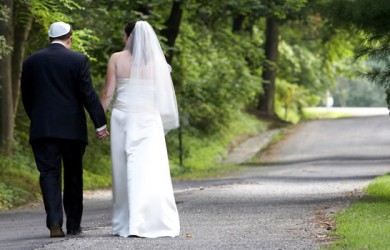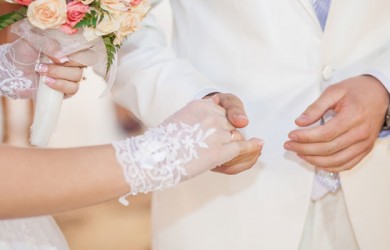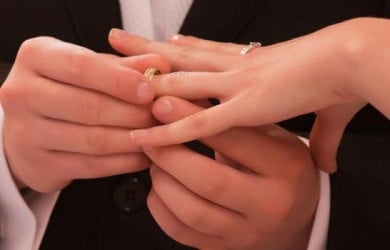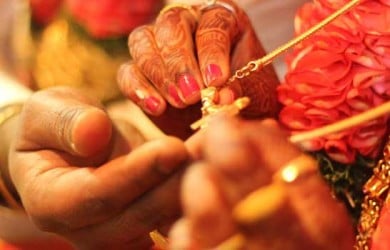Why Are the Common Marriage Vows Important?

 Listen to this article
Listen to this articleThe common wedding vows have stood the test of time historically as an important pronouncement of commitment to one’s chosen spouse.
The history of using typical wedding vows started as long as 1500 years ago, along with the recognition of marriage as a ceremony, agreement, and celebration.
However, in the beginning, it may not even have been the bride and groom making the commitment, but the fathers of those involved. Sometimes, the common marriage vows were used just as a declaration more than a ceremony.
More formal compiling and standardization of vows happened sometime in the 16th century. The words are not always the same in every tradition or religion, but usually, they are an oath to the significant other’s commitment to a lifetime.
The pledge is usually decreed by both parties so that the sense of commitment is mutual, without either partner facing a greater stake in the undertaking.
The standard marriage vows in the Christian and Jewish religions are quite similar, and surprisingly do not focus so much on religion. The focus during the actual vows is focused on the couple, though surrounded by a religious ceremony.
Looking at some common marriage vows can be a great source of inspiration for you to pronounce your commitment to your spouse meaningfully.
The traditional marriage oath
The general idea of the wedding scripts can be summarized by some common elements in the following:
I take you, [spouse name], to be my [husband/wife],
To have and to hold
From this day forward,
For better, for worse,
For richer, for poorer,
In sickness and in health,
To love and to cherish,
Until death do us part.
The words are a solemn verification of the commitment, both a declaration and admission into a “club,” which has for many generations enlisted these words as a statement of sentiment and trust.
The historical reverence for the sanctity of the institution of marriage depicts the commitment and contract of one soul to another, and the tradition helps to hold fast couples who join in the bond.
The words embody inherent doubt about the future and a theme that states the commitment isn’t scalable based on potential woes.
The importance of common marriage vows
When you say, the common marriage vows, it is evident that you don’t say them casually, or just for fun. “Worse,” “poorer,” “sickness,” and “death” do something to mar any unfounded optimism with the reality of what it is to live a mortal life.
Even so, the strength of the words is intended to define a sense of comfort in creating a serious commitment to the new spouse, vowing to be a protector, confidant, and ultimate champion.
Essentially portraying that “even in the worst of times, I will stay by your side.” It is a romantic and altruistic message conveyed subtly through these typical marriage vows.
If we compare with another large religious group, the Muslim faith does not necessarily include individual marital vows in the ceremony. It is an option.
The main pronouncement is in agreeing three times, to accept their marriage in accordance with the guidelines of the traditional marriage pact, and following other standard practices.
If optional commitment vows are used, the common rite is different from the perspective of man and woman.
Woman: “I offer myself in accord with the instruction of the holy Koran and Prophet, peace and blessings be upon them. I pledge honesty and sincerity to be an obedient and faithful wife.”
Man: “I pledge in honesty and sincerity to be a faithful and helpful husband.”
There is something to be said for being brief and direct. The woman pledges under the oath of the Prophet while the groom’s pronouncement lacks mention of a higher power, but it seems apparent that the intent is not to make light of the groom’s position.
Instead, the pronouncement falls immediately after the woman’s words and mirrors them and the umbrella of the religious commitment and sensibility. At the same time, the words are quite a bit more upbeat and pleasant while making a statement with a similar intent to Christian and Jewish vows.
The point here is that when marriage pledges are used as part of a ceremony, the goal is to pledge faith and love in isolation from adversity.
The reassurance is a statement of dedication that is to be unbroken regardless of circumstance and fate. Thereby, going through some common marriage vows should be an integral part of your wedding preparations.
Writing your own wedding vows
While other options exist, such as writing one’s own vows and making other personal statements, the vows should not be considered as merely something to ‘get through’ as a part of the ritual. Of course, there is nothing wrong with adding your personal touch to the wedding vows.
You can go about writing your own wedding vows. You can add a dash of humor to the common marriage vows to lighten the prevalent stress during the nuptial ceremony.
Nevertheless, even if you choose to go for personalized wedding vows, you need to make sure that the essence of common marriage vows is not lost. After all, they have been a part of the typical wedding ritual for ages, and carry a deep meaning.
Watch this video to get some tips on writing your own wedding vows.
Conclusion
The common wedding vows are not to be taken lightly, but felt, expressed, desired, and cherished while you are making a statement to your life partner.
Say the wedding vows from your heart, and make a promise to yourself that you will do your best to follow these words of honor all your life.
 Tips
Tips
Write your tip or submit a video tip
All tips are reviewed before the publishing.
Share this article on
Want to have a happier, healthier marriage?
If you feel disconnected or frustrated about the state of your marriage but want to avoid separation and/or divorce, the marriage.com course meant for married couples is an excellent resource to help you overcome the most challenging aspects of being married.

























 We'd love your feedback!
We'd love your feedback! Thanks for your feedback!
Thanks for your feedback!
